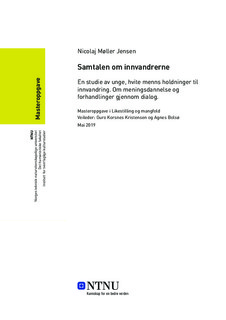| dc.contributor.advisor | Kristensen, Guro Korsnes | |
| dc.contributor.advisor | Bolsø, Agnes | |
| dc.contributor.author | Jensen, Nicolaj Møller | |
| dc.date.accessioned | 2019-10-16T14:00:47Z | |
| dc.date.available | 2019-10-16T14:00:47Z | |
| dc.date.issued | 2019 | |
| dc.identifier.uri | http://hdl.handle.net/11250/2622631 | |
| dc.description.abstract | I denne masteroppgaven undersøker jeg hvilke holdninger unge hvite menn har til innvandring, og hvorvidt disse holdningene er forhandlingsbare gjennom dialog. Det empiriske grunnlaget i oppgaven er tre fokusgruppeintervjuer, med tre informanter i hvert intervju. Datamaterialet fra disse tre samtalene presenteres gjennom tre analysekapitler, der jeg bruker tematisk analyse, kategorisering og fortolkningsrepertoar som analysegrep.
Det første analysekapitlet tar for seg tre temaer som fremsto som særlig viktige for informantene gjennom samtalene. Det første temaet, identitet, tar for seg informantenes skildring av to ulike kulturelle verdener som innvandrere må forholde seg til, og som ifølge dem gjør det vanskeligere for innvandrere enn for majoritetsbefolkningen å finne sin plass i samfunnet. Det andre temaet, verdier, handler om at informantene ser på ulike verdisyn som problematisk. Informantene mente at innvandrere må tilpasse seg et vestlig verdisett, og at slik verdiassimilering er et naturlig resultat av integrering. Det siste temaet, toleranse, handler om informantenes anerkjennelse av ny kultur. Toleranse ble beskrevet som noe alle mennesker må vise hverandre, uavhengig av om man er medlem av majoritetsbefolkningen eller en minoritetsgruppe.
I det andre analysekapitlet undersøker jeg meningsspennet som finnes om innvandring i gruppene. Jeg har i materialet funnet snillistiske, balanserte, skeptiske og fremmedfiendtlige utsagn. Her etableres det konkurrerende syn på spørsmål om innvandring, gjennom flere kategorier som viser at informantene ikke på forhånd var enige med hverandre i alle spørsmål om innvandring. Disse kategoriene er ulike meningspakker. Det viktigste funnet i dette kapitlet er at informantene gjerne drifter mellom flere kategorier i én og samme samtale. Som informant kan man gjennom et intervju for eksempel uttale seg både balansert og skeptisk.
I det siste analysekapitlet viser jeg hvordan informantene sammen skaper konsensus gjennom dialog. Det var lite konflikt i disse samtalene, til tross for at innvandring i politikk og media ofte diskuteres med polariserende meninger. Selv om det fantes ulike ideer og tanker om innvandring, viser analysen at det er mulig å fremforhandle en felles enighet gjennom dialog. Settingen gjorde det mulig for informantene å teste sine meninger og få respons på disse. Denne responsen viste seg å være avgjørende for hvordan informantene uttalte seg videre i samtalene. | |
| dc.description.abstract | This thesis examines the attitudes of young white men towards immigration, and how these attitudes are negotiable through dialog. The empirical basis in this thesis is three focus groups, where each group consists of three informants. The data is presented through three different analytic concepts; thematic analysis, categorisation and interpretative repertoires.
The first analysis chapter presents three themes that played a crucial role for my informants during the conversations. The first theme, identity, shows how the informants portray two different cultural spheres that immigrants must deal with. According to the informants, this makes it more difficult for immigrants than for the majority population to find their place in society. The second theme, values, was important because the informants pointed out different values as problematic. The informants believed that immigrants must adapt to a Western set of values and that such value assimilation is a natural result of integration. The last theme, tolerance, is about the informants' recognition of new culture. Tolerance was described as something every human being must show each other, regardless of whether one is a member of the majority population or a minority group.
In the second analysis chapter I examine the different opinions that exists about immigration in the groups. In the data, I have found statements that has helped me establish the categories misplaced kindness, balanced, sceptical, and xenophobic. Through these categories, I demonstrate the presence of competitive views about immigration. This shows that the informants did not necessarily agree from the beginning. The analysis also shows how informants drift between different categories during the conversation. The informants did not solely express themselves positive or negative in all aspects within immigration.
The third analysis chapter demonstrates how the informants create consensus through dialog. There was little conflict in these conversations, despite the fact that immigration in politics and media often are discussed with polarizing opinions. Even though the opinions of the informants differed, the analysis shows that it is possible to negotiate a common agreement through dialog. The focus group setting made it possible for the informants to express their opinions and get response from the other informants. This response seemed to determine the way the informants expressed themselves later in the conversation. | |
| dc.language | nob | |
| dc.publisher | NTNU | |
| dc.title | Samtalen om innvandrerne | |
| dc.type | Master thesis | |
